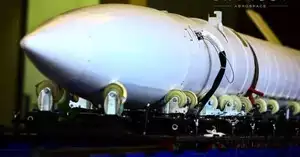According to a report published in The Hindu today, November 18, 2022, today the Indian space sector has created a new landmark for itself. The first-ever privately developed rocket in India, Vikram-S lifted off from the Indian Space Research Organisation (ISRO) spaceport which is in Sriharikota, around 11:30 a.m.
Vikram-S makes a befitting tribute to the father of the nation’s space program Vikram Sarabhai has tasted its maiden mission success today. Skyroot Aerospace which designed this rocket has become the first private company in India since the space sector for private players was opened by the Center in 2020. The three satellites riding behind the launch vehicle measuring 6 meters have come from the startup group based in Chennai named, SpaceKidz. N-SpaceTech in Andhra Pradesh and Armenian BazoomQ Space Research Lab.

This mission which was named Prarambh, which means the beginning had aimed to launch the Vikram-S (VKS) as a single-stage solid-fuelled sub-orbital rocket. Pawan Goenka, the Chairman of the nation’s space regulator, the Indian National Space Promotion and Authorisation Center has said that he is happy on announcing its success. The rocket reached an altitude of 89.5 km having a range of 121.2 km, exactly what Skyroot Aerospace had wanted it to be.
It had worked out as per the plan demonstrated by Skyroot Aerospace. The rocket after being set into the launcher soared taking off at 11;30 am from the sounding rocket complex at about 115 km. This rocket was launched from the sounding rocket complex in ISRO’s Satish Dhawan Space Centre, Chennai. There are two launch complexes in the Satish Dhawan Space Center, Sriharikota. Each of them is capable of giving full support for the vehicle assembly, launch operations, and check-out of various missions. Missions such as Geosynchronous transfer orbit, Low Earth orbit GSLVs. and the PSLVs are launched from this very place.
The success of this mission is indeed a significant milestone for Skyroot Aerospace because it is going to be helpful for testing and validating other major technologies under the Vikram series belonging to the orbital class space launch modes. It would further help in testing various other technologies and sub-systems before and after the lift-of phase of the launch. The launch vehicle of Vikram weighing 545kg, contains the Vikram II and Vikram III series.

Around two years were taken by Skyroot Aerospace for developing this and building it with the help of advanced technology that includes 3D printed components and carbon composite structures. On June 2018, the firm was formed by Kumar Chandana and Naga Bharath Daka. Twice they have won a national award for a space startup having 200 employees. They are the biggest funded space startup with a capital of Rs. 26 crores which have been raised to date.
Mr. Goenka has also further stated that he hopes the Vikram-S rocket begins a new era in the private sector domain in India. Joint efforts from the different ISRO centers have given immense support to this launch of the VKS rocket in a very short time.
